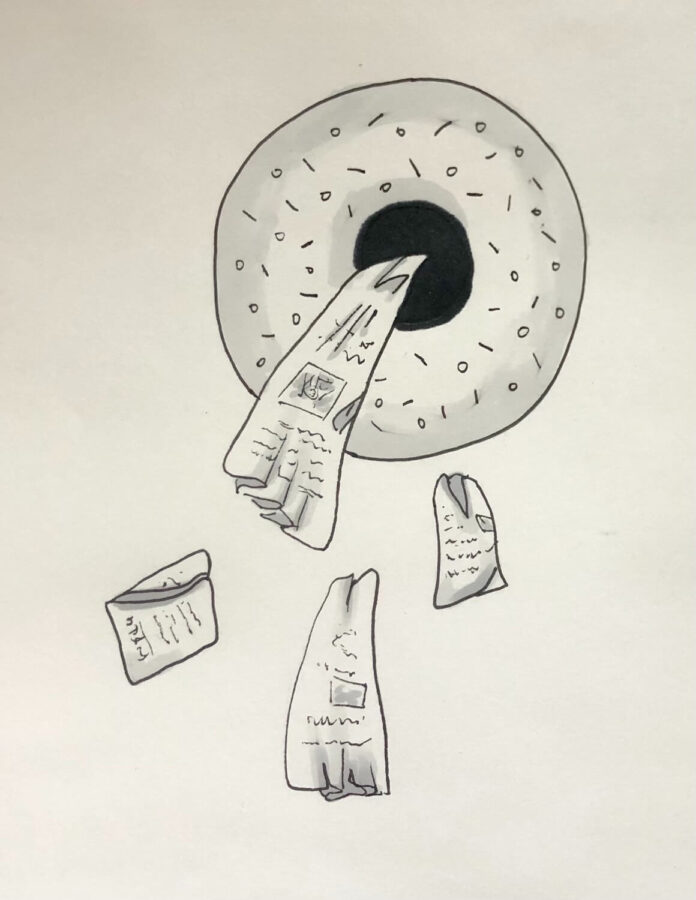Imagine a parallel universe:
Where most of the dialogue in “Everything Everywhere All at Once” sounds like gibberish; where the film was never streamed in the cinema, but only through proxy websites; where the media described Joy Wang’s sexuality as a result of her “life being Westernized” and where the triumph of the film was celebrated on an IMDB alternative called Douban.com.
What if I told you, this universe actually exists? In China, the distribution of Hollywood movies needs to go through a series of complicated examinations by the State Administration of Radio, Film and Television, and films that make it to the big screen usually have their violent, sexual or politically sensitive content castrated. In this film there is no shortage of these types of scenes: One scene explicitly shows a character sitting on a butt plug trophy to activate the verse jump path.
Although Michelle Yeoh has been an all-time favorite in China, “Everything Everywhere All At Once” was not screened in Chinese cinemas. Despite this, Yeoh became the first Asian woman to win the Academy Award for Best Actress. While Western media like the New York Times applauded the messy yet glorious nature of the film, mainland Chinese media like WHB criticized the film as “another conventional production of Hollywood.” The author said the film’s use of Chinese elements like Taichi was exacerbating oriental stereotypes, which clearly undermines the narrative of Asian American experiences.
With no official distribution of the film in China, ordinary Chinese still find their way around appreciating art, although it might be a clear violation of intellectual property. There are more than 203,000 film reviews posted on Douban, a Chinese social networking service that focuses on film and book reviews. Based on more than 495,500 ratings, the film scored 7.6/10 on Douban. Many audience reviews complimented the exquisite portrayal of the mother-daughter relationship in the film. However, on the other side of the spectrum, some criticized the conglomerate and dense visual effects, and some ridiculed the cliche of love and the series of motifs used to illustrate generational trauma.
Disputes on Douban formulate a parallel universe that fights against the narrative created by mainstream Chinese media. When state media denied daughter character Joy Wang’s sexuality, when existentialism fundamental to freedom of individual choice was framed as a betrayal to family and a hijacking of morality, lively discussion on Douban argued otherwise. In an online civil society where everyone functions behind an alias, the Chinese audience built a bridge that connects them with the Asian diaspora through words and sentences. Representation in films legitimizes real-life stories. Through threads commenting on the “true American experience of tax declaration” and supporting LGBTQIA+ identities, they validated the history of the immigrant Chinese family in “Everything Everywhere All At Once.”
The state media’s criticism of the Wangs being an Americanized Chinese household dissociates them from an ever-developing immigrant identity. This accusation, pointing toward them abandoning their traditional heritage, was aimed to mobilize anger among the Chinese in order to create a sense of unity. Yet, commenters on Douban are proof that minds in China are not vulnerable nor homogeneous.
What’s more, Douban serves as a platform that hosts a symposium of love and a discussion of the Chinese ideal of a family. Through sharing their own relationship with their parents, more and more contexts were added to the everything bagel. In a Douban review with 2,852 likes, the author wrote “My parents still couldn’t understand me, but I learned to love and nurture myself, I let myself become my own family.” While some were stuck with the intergenerational trauma, others commented on how “disrespectful the daughter was” and “how irresponsible Evelyn was to marry someone her dad did not approve of.” Despite the deeper connotations behind these comments, Douban was a safe environment that curated together all sorts of spontaneously spoken words from Chinese audiences.
I watched the film with a friend at the AMC Americana at Brand 18, but I couldn’t help but think about my home in China. I called my dad when I was struggling to find a focus for this article, and I was surprised to find out that he had watched the film on an international flight that flew from Singapore to Shanghai. My dad is not fluent in English, so he mainly appreciated the dazzling scenes of martial art fighting in the film. I had to explain to him, who’s a Chinese bun and bing loyalist, what an everything bagel is.
“The bagel is an analogy. If you put everything on it, all your expectations and the high hopes from your parents, it becomes overwhelming,” I explained in Mandarin with the hope that my dad would elaborate on his takeaways about the parent-child relationship.
“I’m in my office right now. Let’s talk later,” my dad said and hung up the phone.
When matters of feeling and emotions are rarely talked about in a Chinese household, the internet became a sentimental outlet. As I write about my hometown and my family from college, people on Douban find their ways around watching a banned film and expressing their intergenerational trauma. It is truly everything, everywhere, all at once.
Contact Renee Ye at rye@oxy.edu
![]()































